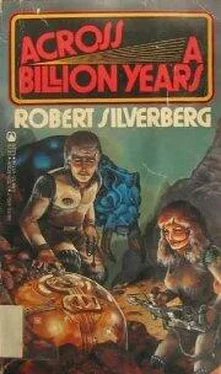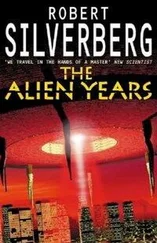September 10, 2375
Higby V
Jan and I almost didn’t make it into town to deliver the press release. Some dumb clump had forgotten to recharge the battery of the electric runabout we use for commuting between town and the site. We were still twelve kilometers from town when the engine gave a soft sighing sound and zapped out. I opened the hood and tried to show masculine competence, but there wasn’t a thing I could do, and we both knew it. Jan called to me, “The battery’s dead. Don’t waste time playing with the engine.”
“What do we do now? Walk the rest of the way?” “It’s starting to rain,” she said. “What a lovely surprise!”
“Let’s wait. Maybe somebody’ll come along.” We waited for half an hour, all alone together in the middle of emptiness. I took no advantage of my great opportunity to slip in a little biology. For one thing, the endless gray downpour that is this planet’s characteristic weather has definitely dismalized my passions. For another, even if I had happened to be in the mood, I wouldn’t have wanted to get involved in anything at the risk of failing to notice a passing car. Traffic isn’t so heavy on that road that stranded wayfarers can afford to let a lot of potential rescuers go by. Most important, though, was this strange and old-fashioned attitude that suddenly came over me: that it would be bad form to launch a possibly quite serious romance in a stalled runabout on a muddy road. Not that Higby V offers more luxurious surroundings anywhere, but I rebelled against the sordidness of it all. I can be quite perverse sometimes. I think you know that.
So instead of leaping lasciviously at each other, we sat chastely side by side and talked. It occurs to me now that Jan may not have shared my sudden puritanism, but it’s too late to do anything about that. Mostly what we talked about was how we happened to go in for archaeology. She asked me, and I said, “It’s because I hate to think that anything goes to waste. I mean, that anything that was ever important or valuable or precious to somebody is just buried and forgotten about. I want to salvage all those things and let them be important to somebody again … so they won’t feel neglected.”
And I told her the Lost Statuette Story.
Do you remember, Lorie? How could you have forgotten? We were six years old. Dad had been on a planet whose name I can’t recall, in the epsilon Eridani system, setting up one of his real-estate deals, and he brought back two little native statuettes as toys for us, one for you, one for me. They were images of pet animals of that planet, made out of some kind of porcelain extremely smooth and voluptuous to the touch, so that once you began fingering it, you didn’t want to stop. You kept your statuette next to your bed at the hospital, and I kept mine in my pocket except when I slept, and then it sat on the night table so I could reach out for it in the night. And I loved that little porcelain animal more than anything else I owned, and then one day Dad took me to watch them constructing a new building he was putting up in Alaska, and I was on this balcony, looking down into the foundation site, with the statuette in my hands, and I sneezed or something and it fell into the site. I started to scream, and told Dad to get it back for me, but the construction machines were too fast; they poured tons of concrete into that hole in the next five minutes. “Make them dig it up!” I said to Dad. “You own the building! You can make them! I want it back!” He laughed and said it would cost thousands of credits to look for my toy under the concrete, and did I want him to waste that much money? Besides, he said, a million years from now archaeologists would come there and explore the ruins of the building and find my toy, and put it in a museum. I didn’t know what an archaeologist was, and I didn’t want the statuette dug up a million years from now, I wanted it right that minute, and I threw such a howling tantrum that they had to take me away and give me something to calm me down. And when you heard what had happened, you said, “Well, if Tom doesn’t have his statue, I don’t want to have mine either,” and you told your nurse to give it away to some other little girl, and she did. Which was a typically subtle and sensitive Lorie-type thing to do, since I was madly jealous that you still had your toy and I had lost mine. I suppose an ordinary good-hearted sister would just have given her own toy to her brother, but you never did things the ordinary way, and what you did was just right, because I wouldn’t have been satisfied with a substitute for what I had lost, but your not having one either somehow took the sting out of the whole incident.
Later I found out what archaeologists were. And started going to museums to see the things they had dug up, including plenty of toys lost by other little boys five or ten or fifty thousand years ago. And it struck me: how sad it is that these things were lost and had no one to love them and care for them. And how fine it is that somebody takes the trouble to find them again, after all those years. Still later I thought: how sad it is that whole civilizations are lost, whole slabs of the past, kings and poets and artists, customs and religions and sculptures and kitchen utensils and tools, and how fine it is that somebody takes the trouble to find them again, after all those years. Then I made up my mind that I was going to be one of the finders. Which horrified Our Father, naturally, since he had already decided I was going to be a real-estate tycoon just like himself. “Archaeology? What kind of thing is this archaeology for someone like you? I’ve got an empire waiting for you, Tom!” I said I was more interested in empires that don’t exist any more. I couldn’t really tell him that at the bottom of everything was a toy animal from epsilon Eridani.
As I finished, Jan said, “When you dug up the globe the other day — that wonderful toy — was it anything like finding your lost statuette again?”
“Yes. Very much. I found a whole world again, Jan. That’s what this is all about.”
“Suppose your father had stopped the construction machinery and ordered his men to dig your toy out of the new concrete? Do you think you’d be on Higby V today?”
“I think I’d be a junior-grade real-estate tycoon today,” I said, and I believe it’s true.
Then I asked Jan why she had become an archaeologist. Her answer was a little disappointing. She didn’t dredge up any dark episodes out of her childhood. “Because it’s interesting,” she said. “That’s all. The idea of finding out what the past was like is very interesting to me.”
Well, of course, that isn’t any answer at all. We know that archaeologists find archaeology interesting; the real problem is why they do. I think the answer is that all of us are looking for some kind of lost toy. We are fighting that force in the universe that nudges everything toward chaos. I mean that we are at war with time; we are enemies of entropy; we seek to snatch back those things that have been taken from us by the years — the childhood toys, the friends and relatives who are gone, the events of the past — everything, we struggle to recapture everything, back to the beginning of creation, out of this need not to let anything slip away. Forgive the philosophizing. I don’t know if Jan or anybody else here would agree with me, and I don’t want to delve. Maybe some of them would say that for them it’s just a job, or a means toward prestige, or a way of passing time, who knows? I really do think that beneath those reasons there has to be something more complicated.
The trouble with a serious, intense discussion, I find, is that it ultimately becomes a little awkward to continue when the people doing the talking don’t know each other too well. In an earnest way we made a stab at talking about Dad’s hostility to my going into archaeology, and likesuch topics, but the atmosphere of earnestness started depressing us. I had to do something. Either make a pass at Jan, which somehow seemed less appropriate than ever after all this solemn palaver, or else get out and pretend I could do something about starting the engine. I got out.
Читать дальше












